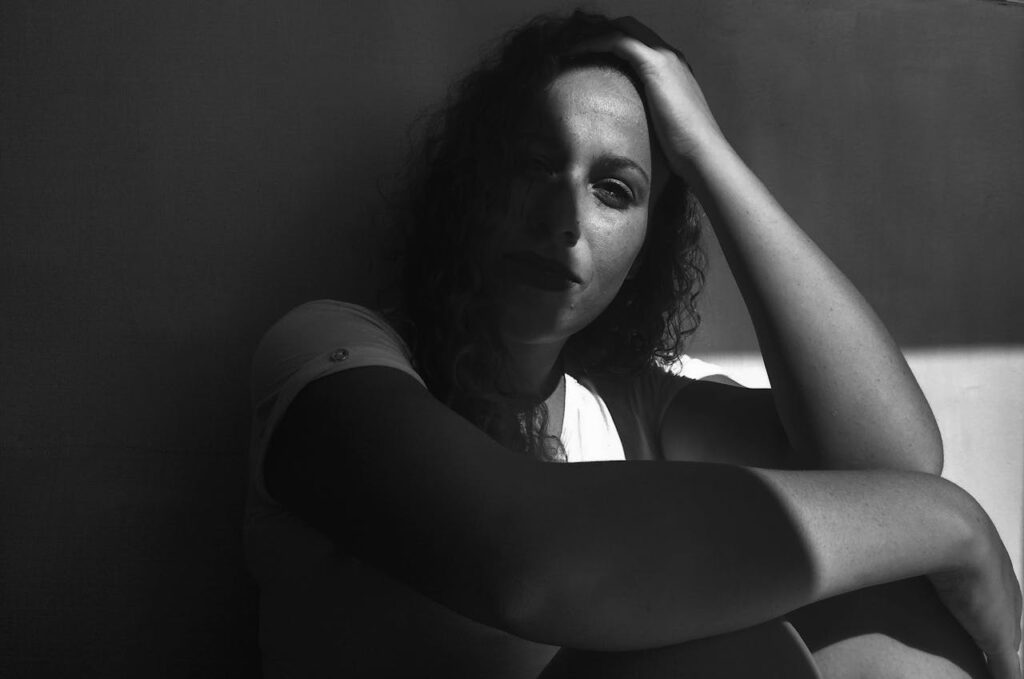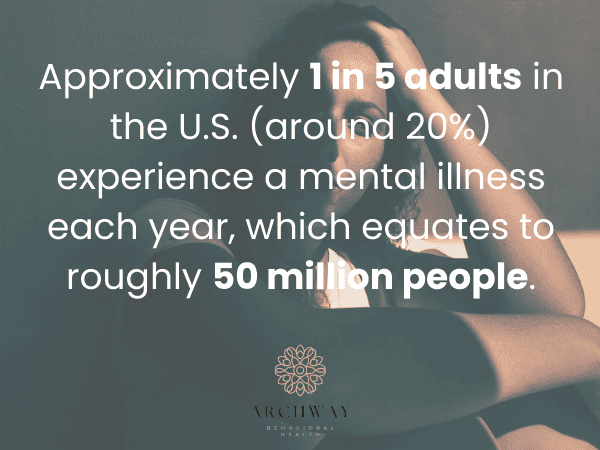Mental health disorders affect millions worldwide and can manifest in various ways, impacting mood, behavior, and overall functionality. At Archway Behavioral Health, we offer a comprehensive range of treatments at our Mental Health Treatment Center, including specialized mental health treatment services such as Dialectical Behavior Therapy (DBT), Cognitive Behavioral Therapy (CBT), and supportive options like One on One Therapy, group therapy programs, partial hospitalization, and Intensive Outpatient Programs. This guide explores the types of mental health disorders and how our programs are tailored to address the unique challenges each condition presents.
Introduction to Mental Health Disorders
Mental health disorders encompass a broad range of conditions that can affect an individual’s mood, thinking, and behavior. These disorders are not simply phases or feelings that pass with time; they are complex conditions that often require professional treatment to manage effectively. Mental health issues can arise from various factors, including genetics, environmental influences, and life experiences, and they can affect people of any age, gender, or background.
At Archway Behavioral Health, we understand that mental health disorders can impact every aspect of a person’s life, from their relationships to their ability to work and function daily. That’s why our Mental Health Treatment Center offers comprehensive mental health treatment services tailored to address each individual’s unique challenges. Through treatments such as Dialectical Behavior Therapy (DBT), Cognitive Behavioral Therapy (CBT), and various support programs, we provide our clients with the tools and strategies they need to improve their mental health and overall quality of life.
Types of Mental Health Disorders
1. Mood Disorders
Mood disorders, such as depression and bipolar disorder, are marked by prolonged emotional disturbances that can range from persistent sadness to intense mood swings. People with depression may experience symptoms such as fatigue, hopelessness, and loss of interest in daily activities. Bipolar disorder, on the other hand, involves alternating periods of depression and mania, which may include high energy, impulsivity, and racing thoughts.
Treatment at Archway: Our Cognitive Behavioral Therapy are equipped to help clients identify and challenge the negative thought patterns that often underlie mood disorders. By combining CBT with medication management and holistic support, clients can gradually regain control over their emotional wellbeing. For those requiring a higher level of care, our partial hospitalization program provides structured, immersive therapy during the day while allowing clients to return home at night.
2. Anxiety Disorders
Anxiety disorders include generalized anxiety disorder (GAD), social anxiety disorder, panic disorder, and phobias. These conditions often result in excessive worry, fear, and avoidance behaviors that can limit one’s ability to function. For instance, those with GAD may struggle with relentless worry, while those with panic disorder may experience sudden, intense episodes of fear.
Treatment at Archway: Our Dialectical Behavior Therapy provide skills in emotional regulation, mindfulness, and stress tolerance. DBT is particularly effective for managing anxiety by helping individuals become more aware of their thoughts and feelings without becoming overwhelmed. For clients needing flexibility in their schedules, our Intensive Outpatient Program (IOP) offers regular therapy sessions that can be integrated into daily life, promoting consistent progress while maintaining personal obligations.
3. Personality Disorders
Personality disorders, such as borderline personality disorder (BPD) and narcissistic personality disorder (NPD), affect a person’s ways of thinking, feeling, and interacting with others. Those with BPD may experience intense mood swings, impulsivity, and instability in relationships. NPD, in contrast, can involve patterns of grandiosity, need for admiration, and lack of empathy.
Treatment at Archway: Our DBT programs focus on helping individuals with personality disorders build skills in mindfulness, distress tolerance, and interpersonal effectiveness. These therapies aid in establishing healthy boundaries, improving emotional regulation, and enhancing self-awareness. Clients benefit from One on One Therapy, where they can work closely with therapists to address unique challenges, as well as group therapy programs that provide peer support and a sense of community.
4. Trauma-Related Disorders
Trauma-related disorders, such as Post-Traumatic Stress Disorder (PTSD), result from exposure to traumatic events, whether a single, life-threatening experience or prolonged exposure to abuse. Symptoms may include flashbacks, avoidance of triggers, heightened arousal, and emotional numbness.
Treatment at Archway: We offer trauma-informed care through our mental health treatment services and partial hospitalization program, providing a supportive, structured environment for those managing trauma symptoms. Utilizing CBT and exposure therapy techniques, our therapists help clients process traumatic memories, reduce the impact of triggers, and rebuild resilience. Our group therapy program also offers a safe space for clients to share their experiences with others who understand their struggles, fostering healing and support.
5. Psychotic Disorders
Psychotic disorders, including schizophrenia and schizoaffective disorder, disrupt an individual’s sense of reality, often resulting in hallucinations (seeing or hearing things that aren’t there) or delusions (firmly held beliefs in things that aren’t true). Schizophrenia, for example, can profoundly impact thinking, emotions, and behaviors.
Treatment at Archway: Individuals managing psychotic disorders benefit from our personalized One on One Therapy sessions, where they work closely with our clinical team to develop coping mechanisms and gain insight into their condition. By incorporating medication management and behavioral therapies, we help clients improve social functioning and enhance self-awareness. Our group therapy programs create an encouraging environment where clients can practice social skills and gain peer support, contributing to a balanced approach to recovery.
6. Eating Disorders
Eating disorders, such as anorexia nervosa, bulimia nervosa, and binge eating disorder, involve unhealthy relationships with food, weight, and body image. These disorders can lead to serious health issues, including malnutrition, heart problems, and digestive issues.
Treatment at Archway: Our Cognitive Behavioral Therapy are specifically equipped to address the underlying issues associated with eating disorders. By focusing on changing thought patterns related to food, self-image, and control, we empower clients to develop healthier coping mechanisms. Clients in our partial hospitalization program receive comprehensive daily support, allowing for intensive therapy and structured meals to promote physical and emotional healing.
7. Obsessive-Compulsive and Related Disorders
Obsessive-Compulsive Disorder (OCD) and related conditions are marked by intrusive, repetitive thoughts (obsessions) and behaviors (compulsions) that can interfere with daily life. These compulsions are often performed in an attempt to reduce anxiety but may offer only temporary relief, leading to a cycle of stress and compulsive behavior.
Treatment at Archway: Our treatment approach combines exposure therapy and CBT to help clients face and manage their obsessions and compulsions effectively. Our Cognitive Behavioral Therapy offer structured, evidence-based interventions, and our Intensive Outpatient Program allows for flexible, consistent care to help clients gradually gain control over OCD symptoms.
Diagnosing and Treating Mental Health Disorders
Diagnosing a mental health disorder requires a thorough assessment by a qualified mental health professional. This process typically involves understanding the individual’s symptoms, medical history, and personal background. At Archway Behavioral Health, our skilled clinicians provide detailed evaluations and diagnostic services to help pinpoint the specific disorder a person may be experiencing. Early and accurate diagnosis is essential because it guides the development of an effective treatment plan.
Once diagnosed, treatment for mental health disorders can include a combination of therapies. Cognitive Behavioral Therapy (CBT), available at our Cognitive Behavioral Therapy Centers, is highly effective in helping individuals identify and modify negative thought patterns that contribute to their symptoms. Dialectical Behavior Therapy (DBT), offered at our specialized DBT centers, is particularly beneficial for conditions involving intense emotional dysregulation, such as borderline personality disorder and certain anxiety disorders. In addition to these therapies, we provide One on One Therapy for personalized support, group therapy programs for shared healing and peer support, and flexible treatment options like partial hospitalization programs (PHPs) and Intensive Outpatient Programs (IOPs) for those needing structured yet adaptable care.
Why Choose Archway Behavioral Health for Mental Health Treatment?
At Archway Behavioral Health, we recognize that mental health is deeply personal, and there is no universal treatment for all. Our Mental Health Treatment Center is designed to offer a wide range of therapeutic options that can be tailored to each individual’s needs, including One on One Therapy for focused support and group therapy programs for shared experiences and insights. Whether you need the structure of a partial hospitalization program or the flexibility of our Intensive Outpatient Program, we provide a caring, compassionate environment that encourages growth, resilience, and hope.
Get Started on Your Journey to Mental Wellness
At Archway Behavioral Health, our team is dedicated to guiding you through every step of your mental health journey. From comprehensive assessments and individualized treatment plans to ongoing support through our DBT and CBT programs, we’re here to help. If you or someone you love is experiencing challenges related to mental health, don’t wait. Reach out today at (888) 488-4103 and take the first step towards hope and healing.
Frequently Asked Questions
What are some common signs of mental health disorders?
Mental health disorders vary, but common symptoms may include persistent feelings of sadness, extreme mood swings, excessive worry or fear, changes in sleeping or eating patterns, difficulty concentrating, and withdrawal from social activities. If you or a loved one is experiencing any of these symptoms, seeking professional help is an important first step.
How can Cognitive Behavioral Therapy (CBT) and Dialectical Behavior Therapy (DBT) help with mental health disorders?
Cognitive Behavioral Therapy helps individuals recognize and alter negative thought patterns, which can lead to healthier behaviors and improved emotional well-being. Dialectical Behavior Therapy, on the other hand, focuses on emotional regulation, mindfulness, and interpersonal skills, making it particularly useful for people dealing with intense emotions or relationship challenges. Both therapies are offered at Archway Behavioral Health and can be customized based on individual needs.
What is the difference between partial hospitalization and intensive outpatient programs?
Partial hospitalization programs (PHPs) provide structured, intensive treatment during the day while allowing clients to return home in the evenings. This level of care is suitable for individuals who need more support than outpatient treatment but don’t require 24-hour supervision. Intensive outpatient programs (IOPs) offer flexibility, with several therapy sessions each week, making them ideal for those who need regular support but wish to maintain their daily routines.
How do I know which treatment program is right for me?
Choosing the right treatment program depends on several factors, including the severity of symptoms, personal preferences, and lifestyle needs. At Archway Behavioral Health, our clinical team performs comprehensive assessments to recommend the most appropriate level of care, whether it’s our One on One Therapy, group therapy, PHP, or IOP.



